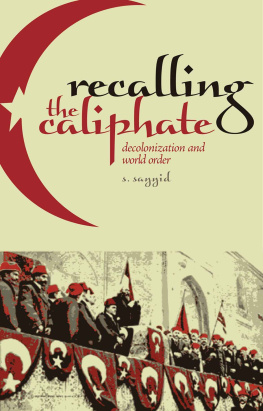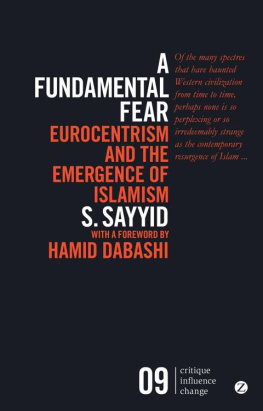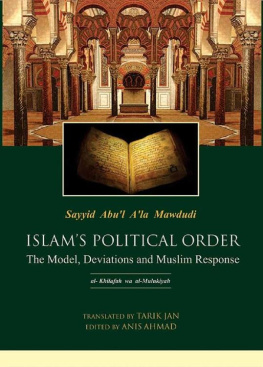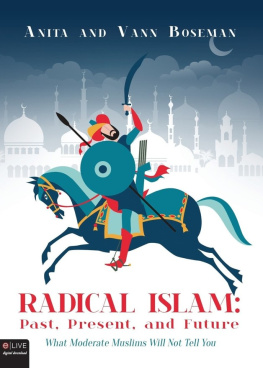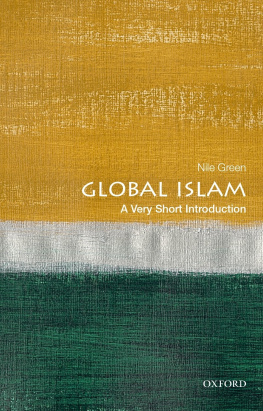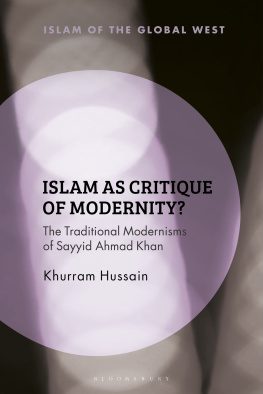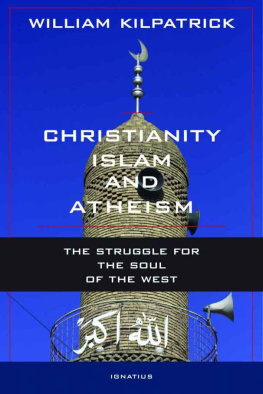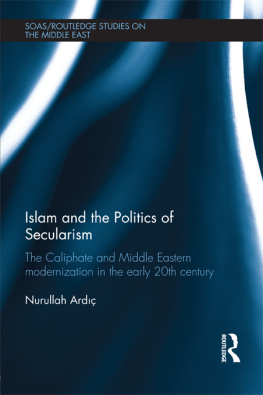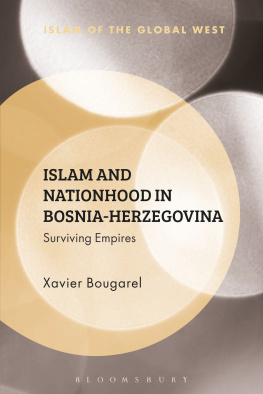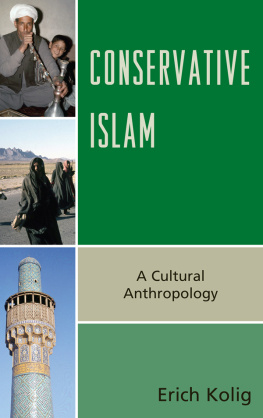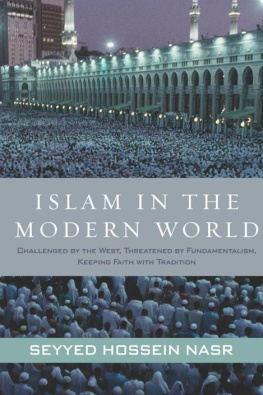RECALLING THE CALIPHATE
S. SAYYID
Recalling the Caliphate
Decolonisation and World Order
HURST & COMPANY, LONDON
First published in the United Kingdom in 2014 by C. Hurst & Co. (Publishers) Ltd., 41 Great Russell Street, London, WC1B 3PL S. Sayyid, 2014 All rights reserved. Printed in India
Distributed in the United States, Canada and Latin America by Oxford University Press, 198 Madison Avenue, New York, NY 10016, United States of America.
The right of S. Sayyid to be identified as the author of this publication is asserted by him in accordance with the Copyright, Designs and Patents Act, 1988.
A Cataloguing-in-Publication data record for this book is available from the British Library.
ISBNs: 978-1-84904-0020 (hardback) 978-1-84904-0037 (paperback)
www.hurstpublishers.com
This book is printed using paper from registered sustainable and managed sources.
In memory of Kishver Nasreen Shah
CONTENTS
It is inevitable that an enterprise stretching over many years and several continents would incur debts from friends, colleagues and fellow travellers. To paraphrase an African proverb (apparently) it takes a village to put together a book. As I lack the means to repay my debtors, I am more than happy to confess the unstinting assistance of my fellow virtual villagers that helped make this book possible. I would like to thank AbdoolKarim Vakil and Barnor Hesse for generously donating so much of their hard-pressed time to comment on various drafts of various chapters. Ramon Grosfoguel and Brian Klug have over the years become conversational sparring partners and I have learnt as much from our differences as from our agreements.
Riding around the streets of Ankara in a crammed white Renault after dark is not a bad way to meet kindred spirits, and since that spiritual car journey Yasin Aktay, Cemal Haimi and Nur Yilmaz have done much to show that decolonisation is not only theoretical speculation but a lived practice.
I was fortunate while writing this book to be engaged with a critical race theory research team arranged around the TOLERACE project. This provided a convivial space to discuss and debate ideas, some of which have come to animate this book. In particular I want to recognise the contributions of Marta Araujo, Silvia Rodriguez Maseo, Katypal Sian and of course Ian Law, with whom I shared many conversations none more cinematic than during a frantic drive across Europe when volcanic ash from Iceland had left us stranded in Lisbon.
My Antipodean sojourn would have been arduous if it had not been for the generosity, good humour and diligence of a number of people I was lucky enough to meet. I would especially like to mention: Minerva Nasser-Eddine, Lyn Browning, Sanam Saitov and her family, and Mary Jolly. Shvetal Vyas-Parae whose effervescent intelligence and boundless enthusiasm made her an excellent research assistant and whose efforts (ably supported by the stoicism of Vipal Vyas) were invaluable in bringing this book to its conclusion. Of course, this book would have been the much the poorer without the interventions and interruptions provided by Amir, Yamina, Lilian and Imran.
The ideas contained in this volume were aired in a number of venues, and I am grateful for the various institutions and groupings whose invitations provided a platform for me to sharpen my arguments. I would like to single out South Australia State Library Study Circle and in particular the participation of Uzma Jamil, Muhammad Kotan and Lejla Voloder; they gathered weekly to discuss hegemony and the relationship between the ethical and the political, often in the most exacting circumstances.
Finally I would like to thank a number of people including Warren Chin, Tariq Modood, Amr Sabet, Paul Taylor, Hatem Baizan, Houria Bouteldja, Veena Ahmed, Junaid Ahmad, Farid Esack, Itrath Syed and M. G Khan, as well as the Brighton Beach Reading Club for their en passant promptings and impassioned positionings.
Earlier versions of some of the chapters in this book have previously been published in various forms and are included here with the permission of the publishers or editors of the journals and collections listed below.
ersion of an article published as After Babel: Dialogue, Difference and Demons in Social
Identities: Journal for the Study of Race, Nation and Culture, Volume 12, Issue 1 (2006): pp. 515.
, Secularism, is a revised version of a chapter that appeared as Contemporary Politics of Racism in Levey, G. & T. Modood (eds), Secularism, Religion and Multicultural Citizenship, Cambridge: Cambridge University Press, 2009.
elativism, is substantially re-written, elements of it appeared as Bad Faith: Anti-Essentialism and Universalism in Brah, Avtar and Annie. E. Coombes (eds), Hybridity and its Discontents, London: Routledge, 2000.
emocracy, is re-written version of an article that first appeared as Mirror, Mirror, Western Democrats, Oriental Despots? Ethnicities, Vol. 5, Number 1, March 2005, pp. 3050.
Futorology, is a re-drafted English translation of a chapter that first appeared in Spanish as Dune, Decolonizar el futuro in Vzw, C., (ed.), Suturas y Fragmentos: Cuerpos y Territorios en la Ciencia Ficcion, Barcelona: Fundacio Antoni Tapies, 2006.
, Diaspora, is a modified and updated version of a chapter that appeared as Beyond Westphalia: Nations And Diasporas, in Hesse, B. (ed.), Unsettling Multiculturalism, London: Zed Books, 2000.
ermeneutics, is a largely re-written version of an article published as Rituals, Ideals and Reading the Quran, American Journal
of Islamic Social Sciences, Vol. 23, No. 1. Winter 2006, pp. 5265.
The vanquished always want to imitate the victor in his distinctive characteristics, his dress, his occupation, and all his other conditions and customs. The reason for this is that the soul always sees perfection in the person who is superior to it and to whom it is subservient. It considers him perfect, either because it is impressed by the respect it has for him, or because it erroneously assumes that its own subservience to him is not due to the nature of defeat but to the perfection of the victor.
Ibn Khaldun (1978: 116)
I
Islam is the name that gives Muslims a name. For Muslims it is perhaps the most proper of names, a name that loses its singularity when transcribed outside Muslim contexts. After all, what is Islam in a world dominated by the Western enterprise but a scandal? The contemporary struggle around the name of Islam takes place against the background of a kind of defeat that on so many levels seems proximate to that described by Ibn Khaldun in the quotation that is the epigraph for this volume. Ibn Khaldun seems to suggest that the defeated see the judgement of defeat in terms of the qualities of the victor, for this defeat is not purely military but can have profound cultural impacts. Does this description not capture with great acuity the condition of the ummah? The analysis of the cultural effects of military and political defeats experienced on a grand scale over a longue dure could be said to resonate in the contemporary world under the broad heading of postcolonial thought.1 The conflict that haunts postcolonial writing was inaugurated by Christendoms appropriation of the Western hemisphere and the subsequent expansion of Europe through the process of conquest, and the establishment of a planetary colonial political economy (Venn, 2006: 4758). In this defeat the line between the West and the nonWest became the axis of the world. In this world the superiority and normality of the West was institutionalised and constantly contrasted with the inferiority and abnormality of the non-West.
The reconfiguring of the world along the lines of a violent hierarchy between West and non-West came to consume the
Next page

